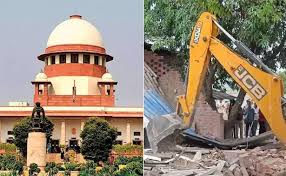NEW DELHI: Amid allegations of selective demolition of unauthorised constructions belonging to members of a particular community in BJP-ruled states as a punitive measure, the Supreme Court on Wednesday declared “bulldozer justice” unconstitutional, saying the executive could not demolish residential and commercial properties of persons only on grounds that they were accused or convicted of a crime.
“It is a settled principle of criminal jurisprudence as recognised in our country that a person is presumed to be innocent till he is held guilty… if demolition of a house, wherein number of persons of a family or a few families reside, is permitted only on grounds that one person residing in such a house is either an accused or convicted in the crime, it will amount to inflicting a collective punishment on the entire family or the families residing in such structure,” a Bench led by Justice BR Gavai said.
Noting that the right to shelter was one of the facets of Article 21 (right to life and liberty), the Bench said, “Depriving such innocent people of their right to life by removing shelter from their heads… would be wholly unconstitutional.”
Pronouncing the verdict on petitions challenging arbitrary demolition of properties of accused persons, Justice Gavai said, “It is not a happy sight to see women, children and aged persons dragged to the streets overnight. Heavens would not fall on the authorities if they hold their hands for some period.”
“The chilling sight of a bulldozer demolishing a building, when authorities have failed to follow the basic principles of natural justice and have acted without adhering to the principle of due process, reminds one of a lawless state of affairs, where ‘might was right’,” it said.
Exercising its powers under Article 142 of the Constitution, the Bench, which also included Justice KV Viswanathan, laid down detailed guidelines on demolition of properties. It said no order on demolition could be passed without a 15-day prior show-cause notice and without giving a hearing to the affected persons and actual demolition could be carried out only 15 days after the final order had been passed.
The top court, however, said, “We clarify that these directions will not be applicable if there is any unauthorised structure in any public place such as road, street, footpath, abutting railway line or any river body or water body and also to cases where there is an order for demolition made by a court of law.”
It said the affected party needed to be given sufficient time to challenge the demolition before an appropriate forum. “We are further of the view that even in cases of persons who do not wish to contest the demolition order, sufficient time needs to be given to them to vacate and arrange their affairs,” it said.
Holding that the executive could not replace the judiciary in performing its core adjudicatory functions, the top court said, “In our view, such a situation would be wholly impermissible in our constitutional set up.” It said, “If the executive acts as a judge and inflicts penalty of demolition on a citizen on grounds that he is an accused, it violates the principle of ‘separation of powers’. We are of the view that in such matters, the public officials, who take the law in their hands, should be made accountable for such high-handed actions.”
The top court warned the authorities “that violation of any of the directions would lead to initiation of contempt proceedings in addition to the prosecution.” “The officials should also be informed that if the demolition is found to be in violation of the orders of this court, the officer/officers concerned will be held responsible for restitution of the demolished property at his/their personal cost in addition to payment of damages,” the Bench ordered.
“The Registrar (Judicial) is directed to circulate a copy of this judgment to the Chief Secretaries of all the states, union territories and Registrar Generals of all the High Courts. All state governments shall issue circulars to all the district magistrates and local authorities intimating them about the directions issued by this court,” the Bench said.
To Solicitor General Tushar Mehta’s submission that in some cases it may be by sheer coincidence that the properties which were in breach of local municipal laws governing them also happen to belong to the accused persons, the top court said, “…when a particular structure is chosen all of a sudden for demolition and the rest of the similarly situated structures in the same vicinity are not even being touched, mala fide may loom large.
“In such cases where the authorities indulge in arbitrary pick and choose of the structures and it’s established that soon before initiation of such an action an occupant of the structure was found to be involved in a criminal case, a presumption could be drawn that the real motive for such demolition proceedings was not the illegal structure but an action of penalising the accused without even trying him before the court of law,” it said, adding such a presumption was rebuttable.


